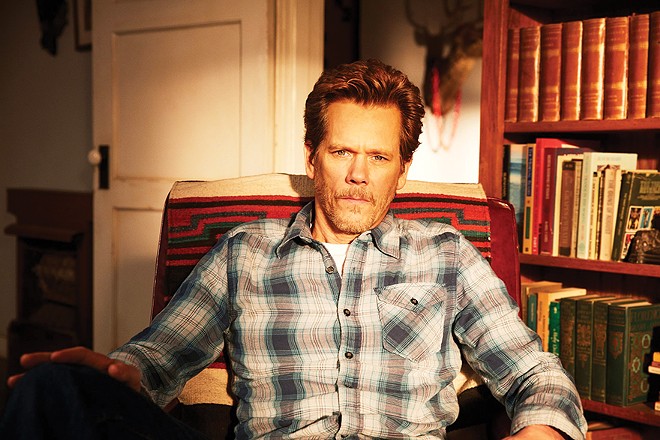Kevin Bacon has been around quite a while, so much so that we take him for granted. His solid, understated approach, a "don't just do something, stand there" technique that makes him a worthy successor to Clint Eastwood in that regard, is one that is often overlooked. Never nominated for an Oscar, he's right there with Kurt Russell as far as being a performer who's comfortable and capable in every genre, an actor that anchors any production he's in, who audiences have come to accept as not simply a reliable, but welcome, presence.
His latest, You Should Have Left, is an exercise that would likely have floundered without him. A unique ghost story from the modern house of horror, Blumhouse Productions, it's a formula thriller with just enough style and an inspired twist to make it worthwhile. In the tradition of the studio's Insidious and Sinister, this is a domestic drama with a supernatural bent that, much like the classic Universal horror films, relies more on atmosphere and tone to generate thrills, something veteran director David Koepp is able to create with a degree of style that's visual intriguing. That Bacon is able to bring a subtle nuance to his portrayal of a man haunted by his past holds our interest throughout.
Though acquitted for the murder of his wife, Theo (Bacon) isn't allowed to put his past in the past. Due to it having been a high-profile trial, he's often recognized, usually making those who identify him ill at ease. There's just something about the guy, an aura about him that suggests there's something unpleasant lurking beneath the surface. However, Susanna (Amanda Seyfried), an up-and-coming Hollywood actress, was able to see past this; she's married him and they have a young daughter together. That his wife is much younger than him is a constant source of insecurity for Theo, something that begins to create a fissure in their relationship. Tension mounting between them, the family decides to get away, booking a stay in a rather unique home in Wales, one that has a character all its own.
Adapted from the novel by Daniel Kehlmann, Koepp's screenplay is a leanly constructed narrative that methodically doles out key pieces of information at a steady pace, keeping the viewer engaged as one secret after the next is revealed, all of it adhering to an internal logic that remains consistent throughout. The story is never less than engaging while the house where the action takes place becomes a character unto itself. Designed by British architect John Pawson, the structure, known as Life House, is a sprawling building with seemingly numerous hallways and rooms, presented as a modern labyrinth. That it's constructed of dark and light bricks effectively accentuates not simply the dual nature of the house as it's perceived in the film, but Theo's personality as well. In many ways, Koepp's use of location to reflect his characters and generate an unsettling atmosphere is the movie's strongest suit.
Seyfried is solid in a rather thankless role, while the use of local actors to provide a bit of authentic color to the story is welcome. As expected, Bacon provides a strong performance, showing us Theo's descent into madness as a struggle he's destined to succumb to. His assured façade slowly crumbling as the house seemingly closes in on him, the actor is able to generate a degree of sympathy for Theo where perhaps it isn't deserved. Credit him for delving deep enough to find the reason that makes Theo tick and salvaging what otherwise would have been a rote exercise.


